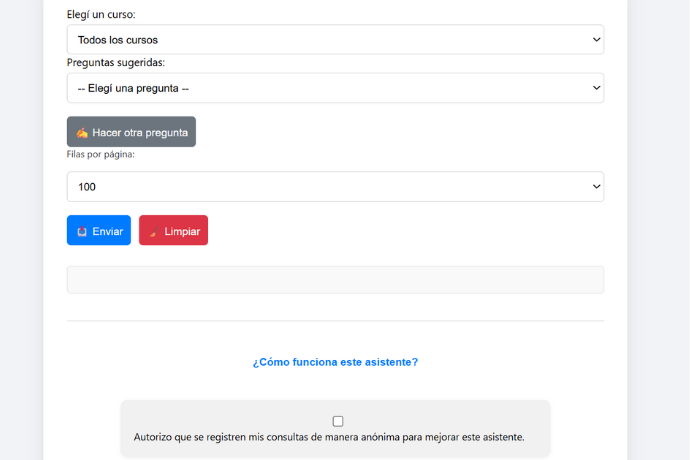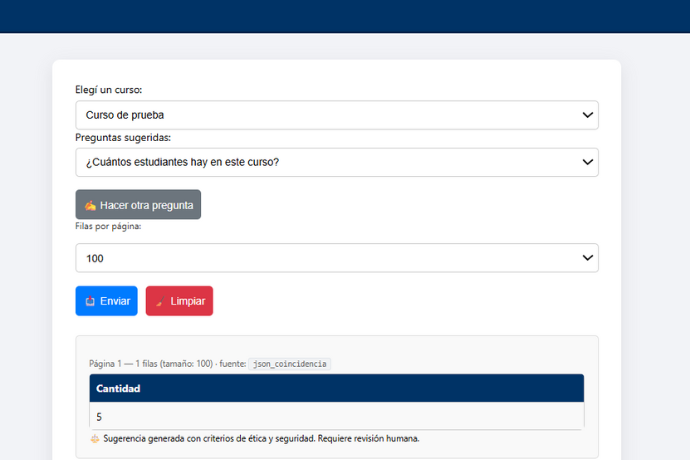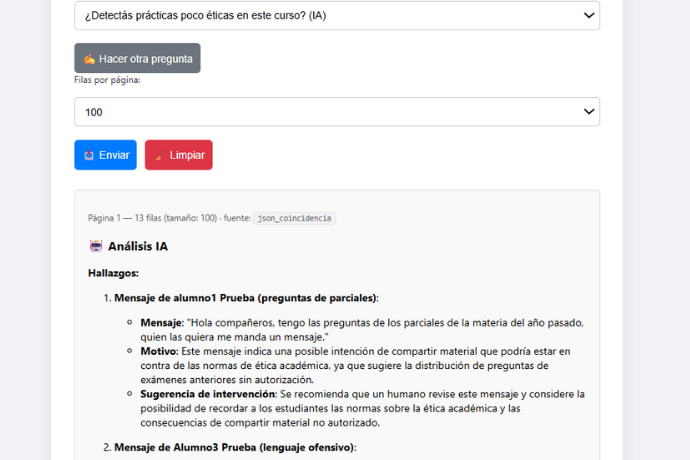
Language
Python
Tool Type
Web app
License
The MIT License
Version
1.0.1
National University of Quilmes

AI Assistant for Academic Inquiries is a web application developed in Python (Flask) that uses generative artificial intelligence and natural language processing. It facilitates academic management and access to information in virtual environments, allowing faculty and students to perform natural language queries on academic data. The system generates automated reports, qualitative analyses, and visualizations without requiring advanced technical knowledge. Designed with an ethical approach, it complies with international standards for human-centered AI. Its modular and scalable architecture allows for adaptation to public and educational institutions, and it was implemented in collaboration with the National University of Quilmes and the Dr. Mario V. Larraín General Acute Hospital.
The AI Assistant solves the problem of inefficient academic management in educational and healthcare institutions by enabling natural language queries, generating automated reports and analyses without requiring advanced technical knowledge. This facilitates agile and personalized pedagogical and administrative decision-making.
Standardized Questions (Direct Queries) The assistant offers a first level of access with predefined queries, which can be for the campus as a whole or for a specific course. This ensures immediate results on common indicators without the need for additional configuration. AI Queries (Advanced Analytics) In a second phase, the user can run general or course-specific queries that incorporate the use of artificial intelligence. Here, AI allows not only the retrieval of quantitative information but also the analysis of patterns, discursive tendencies, emotions, and qualitative aspects of educational interaction. Natural Language Queries (Semantic Search) Finally, the assistant enables the ability to enter free questions in natural language. The AI searches the database of existing questions for those with the same meaning or intent and presents them to the user. The user confirms the most appropriate match with a click, thus obtaining the information they truly need.
HTTP/HTTPS (IETF RFC 7230/2818) → for client-server communication. REST (Representational State Transfer) → open architecture for designing the API exposed by the helper. JSON (ECMA-404 / RFC 8259) → open and widely adopted format for data exchange between the frontend, backend, and API. SQL (ISO/IEC 9075) → standard language for querying relational databases (e.g., MySQL, PostgreSQL). UTF-8 (RFC 3629) → universal character encoding, ensuring multilingual compatibility and accessibility. TLS/SSL (IETF RFC 5246/8446) → open standard for encrypting communications with Certbot/Let's Encrypt.

Connect with the Development Code team and discover how our carefully curated open source tools can support your institution in Latin America and the Caribbean. Contact us to explore solutions, resolve implementation issues, share reuse successes or present a new tool. Write to [email protected]

The interaction cover of the tool is observed.

The question and answer are observed

Do you detect unethical practices?
Teachers can view student participation and performance in a course in seconds, and academic managers can generate automatic campus-wide reports to plan training.
Guides educators, technicians, and managers in using the AI Assistant, addressing consultation practices and responsible AI principles.
The AI Assistant operates as a web application that processes academic and administrative inquiries at three levels: Standardized inquiries (general and course-based).
